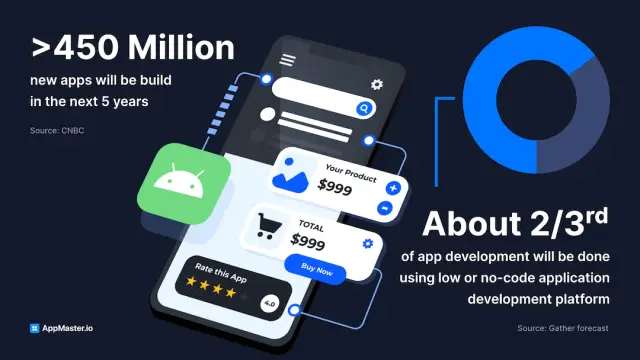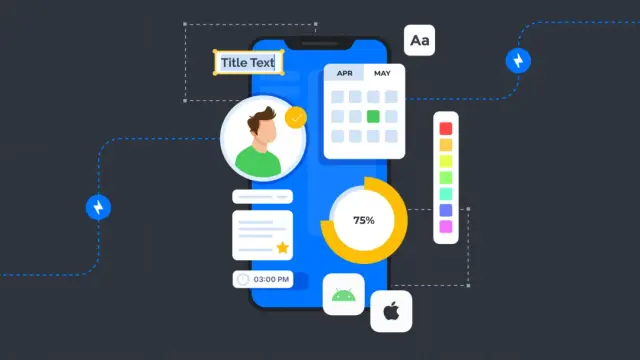How Android App Builders Are Changing the Industry
Discover how Android app builders are revolutionizing the mobile app development industry by simplifying the process, reducing costs, and encouraging innovation. Learn about the advantages of using no-code and low-code platforms like AppMaster.

Android app builders are transforming the mobile app development industry by providing tools and resources that enable developers and non-developers to create mobile apps without extensive coding skills. These solutions often include drag-and-drop interfaces, pre-built templates, and features that simplify the app creation process. In the past, developing an Android app meant having in-depth knowledge of programming languages, such as Java or Kotlin, and investing significant time and resources into the development process.
Yet, Android app builders have changed the game, enabling individuals and businesses to create powerful, feature-rich applications without relying on a traditional software development lifecycle. Increasingly, developers are incorporating no-code and low-code platforms into their toolkit, enabling more efficient and cost-effective app development. The impact of this shift is evident in the growing number of high-quality Android apps created using these tools.
The Growing Popularity of No-Code and Low-Code Platforms
No-code platforms are designed to enable users with little or no programming knowledge to create applications by relying on a visual interface. They offer drag-and-drop interfaces, pre-built templates, and built-in components, allowing users to create functional, visually appealing applications without coding. Low-code platforms, on the other hand, provide a more flexible development environment with minimal coding required. These platforms are intended for professional developers who need to quickly develop apps while maintaining a high level of control over the final product.
Low-code tools help streamline app development, enabling developers to focus on core functionality and user experience rather than getting bogged down in repetitive coding tasks. The increasing popularity of no-code and low-code platforms can be attributed to several factors:
- Reduced Barriers to Entry: With traditional app development, only those with the requisite technical skills could embark on app creation. No-code and low-code platforms have democratized app development, enabling a wider range of individuals and businesses to develop Android applications.
- Time and Cost Savings: Developing applications using no-code and low-code tools is generally faster and more cost-effective than traditional app development methods. The simplified development process makes it possible to create functional apps in a fraction of the time, requiring fewer resources.
- Greater Flexibility: No-code and low-code platforms often offer a high degree of customization through pre-built components, allowing users to create unique, tailored applications that meet their specific needs.
- Rapid Iteration and Growth: The ability to quickly prototype, test, and iterate using no-code and low-code tools has greatly accelerated the development of innovative applications for Android devices.

Key Advantages of Android App Builders
By simplifying the app creation process, Android app builders offer several key benefits over traditional development methods:
- Reduced Development Costs: Android app builders require significantly fewer resources than traditional app development, reducing costs associated with hiring an additional development team. Moreover, the ease and speed of app updates and changes lead to reduced maintenance costs and a longer app lifespan.
- Streamlined App Development Process: Drag-and-drop interfaces and pre-built templates simplify app creation and eliminate repetitive tasks that typically bog down developers. With app builders, developers can focus on creating visually appealing, functional applications without getting overwhelmed by complex coding tasks.
- Increased Accessibility: The user-friendly nature of Android app builders encourages individuals and businesses without technical knowledge to create mobile applications. By opening up the app development process to a wider audience, more innovative, diverse apps are entering the market.
- Encouraging Innovation: The simplified app development process provides a fertile creative environment. Android app builders enable developers and non-developers to experiment, test new ideas, and iterate over their apps without the need for significant time or resource investment. This fosters a culture of innovation that drives the mobile app development industry forward.
- Reducing Technical Debt: With Android app builders, applications can be easily updated or changed with minimal impact on existing features and functionality. This reduces the accumulation of technical debt, improving the long-term viability of mobile apps.
The advantages offered by Android app builders are reshaping the mobile app industry, making it more accessible, efficient, and innovative. While no-code and low-code platforms might not be suitable for all mobile app development tasks, they have undeniably altered the app development ecosystem and are likely to continue to play a vital role in the future of Android app development.
Real-Life Success Stories Using Android App Builders
Android app builders have enabled countless businesses and entrepreneurs to quickly create and launch their mobile apps, thus realizing their innovative ideas in the market. Let's dive into some real-life success stories that demonstrate the transformative impact of Android app builders.
- Coffee shop chain streamlines order process: A regional coffee shop chain decided to improve their customer experience by launching a mobile app for easy ordering and payment. They opted for using an Android app builder that allowed them to create a feature-rich app with a user-friendly interface quickly. The app effectively included loyalty programs, personalized promotions, and real-time order tracking. Choosing a no-code platform saved considerable time, resources, and cost, as they didn't need to engage a dedicated app development team.
- City navigation app for tourists: A group of tourism and technology enthusiasts joined hands to develop a city navigation app for tourists. Utilizing a low-code platform, they created an Android app with an interactive map that highlights local points of interest, displays public transport options, and provides audio-guided tours. Their app garnered incredible interest from travelers who appreciated its easy-to-use nature. Being non-developers, the group could swiftly iterate and make improvements to the app based on users' feedback, without worrying about the coding complexities.
- E-commerce store for a small business: A homemade crafts business wanted to expand its outreach in the market by launching a mobile app for their e-commerce store. Yet, being a small team, they didn't have the resources to invest in a custom app development. They utilized an Android app builder to create a visually appealing e-commerce app that included features like product listings, shopping cart, and secure payment methods. By opting for a no-code platform, they successfully launched their app in the market without stretching their budget or sacrificing the quality of their app.
AppMaster: A Powerful Tool for Creating Android Apps
AppMaster is a prime example of a powerful Android app builder that revolutionizes the app development process, making it easy, efficient, and cost-effective. Their no-code platform offers extensive features to create backend, web, and mobile applications. Here are the key advantages of using AppMaster for Android app development:
- Comprehensive app development environment: AppMaster provides an all-in-one development environment where users can easily create and manage their apps with various features. Users can visually create data models, build business processes, and generate REST API and WebSocket Endpoints without manual coding.
- Time and cost-efficient development: With AppMaster, users can develop applications up to 10 times faster and at a fraction of the cost compared to traditional development methods. It eliminates the need for a dedicated development team and enables businesses of all sizes to bring their apps to market quickly.
- Elimination of technical debt: One of the significant benefits of using AppMaster is that it generates applications from scratch every time a change is made to the blueprints. This allows users to develop comprehensive software solutions that are free from technical debt, ensuring optimal performance and scalability.
- Flexible subscription options: AppMaster offers various subscription options to suit the needs of different users, from startups to enterprises. These include a free tier to explore the platform, all the way up to enterprise solutions that include source code access and the ability to host applications on-premises.
- Exceptional customer support and resources: In addition to the extensive platform capabilities, AppMaster provides reliable customer support and a wealth of resources to help users make the most of their app development journey.

Limitations and Considerations
While Android app builders have undeniably simplified the app creation process, it's important to recognize that they come with certain limitations. Many app builders may not offer the same level of flexibility or customization as traditional coding. Developers working on complex applications may find that app builders confine them to predefined functionalities and design capabilities, making implementing unique or intricate features challenging.
Performance and Security Aspects
Performance is another consideration. Apps built using no-code platforms can sometimes be less optimized than their traditionally coded counterparts, potentially leading to slower run times or increased battery usage. This is particularly evident in resource-intensive applications, such as those requiring heavy data processing or graphics. Security is a paramount concern, and while app builders regularly update their platforms to address vulnerabilities, the layered nature of no-code tools can introduce security challenges that may not be as prevalent in custom-coded applications.
When to Choose a Traditional Development Approach
Deciding between an app builder and traditional development hinges on various factors. If an app requires highly specific performance optimizations or needs to incorporate complex, bespoke functionalities, traditional coding might be the better path. Moreover, large enterprises or businesses subject to strict regulatory compliance may prefer traditional development to ensure that all security and privacy standards are met without exception. It's essential for businesses to thoroughly assess their needs, considering both their immediate objectives and long-term strategy, to determine which approach aligns best with their vision.
While Android app builders have significantly broadened access to app development, they are not a one-size-fits-all solution. Developers and businesses must weigh the benefits of rapid development and cost savings against the need for customization, performance, and security. By carefully evaluating their specific requirements and the inherent limitations of no-code platforms, stakeholders can make informed decisions that best support their application's goals and user expectations.
The Future of Android App Development
The mobile app industry continues to evolve, and the future of Android app development will likely witness a significant impact from innovative technologies and development trends. Here are some key factors shaping the future of Android app development:
- Growing adoption of no-code and low-code platforms: More businesses and developers will turn to no-code and low-code platforms like AppMaster to create their apps quickly and economically. Such platforms offer a user-friendly development environment that encourages innovation while saving time and resources.
- AI-generated code and automation: Artificial intelligence will continue to generate code and automate parts of the development process. As a result, the focus will shift from manual coding to harnessing the capabilities of AI-based systems, making app development more efficient and accessible.
- New technologies integration: Developers will embrace emerging technologies to enhance the app experience further. For example, integration with IoT devices, AR/VR elements, and the use of voice assistants will become increasingly popular in Android app development.
- Enhanced focus on app security: As cyber threats become more sophisticated, app builders and developers will pay more attention to app security. The future will witness new security protocols, standards, and practices that will make Android apps more secure and less vulnerable to potential attacks.
- Cloud and edge computing: Cloud and edge computing technologies will continue to impact the app development space, allowing users to build and host their apps more efficiently, regardless of their scale and complexity.
Android app builders like AppMaster are bound to play a significant role in shaping the future of app development, allowing developers and business owners alike to benefit from their simplicity, efficiency, and innovation potential.
FAQ
Android app builders are software tools that enable developers and non-developers to create mobile apps for Android devices without the need for extensive coding skills. They commonly include drag-and-drop interfaces and pre-built templates.
No-code platforms enable users with little or no programming knowledge to create applications by relying on a visual interface. Low-code platforms, on the other hand, provide a more flexible development environment with minimal coding, targeting professional developers who need to develop apps more quickly.
Android app builders can significantly reduce development costs by simplifying the process, requiring less time and resources to create an app. They also eliminate the need for hiring an additional development team and enable quicker app updates and changes.
AppMaster is an excellent example of a powerful Android app builder. It's a no-code platform that enables users to create backend, web, and mobile applications, offering a range of features, from database schema creation to business process and API generation. It is also backed by swift customer support and extensive resources.
Android app builders encourage innovation by providing a user-friendly environment that allows developers and non-developers to experiment, test new ideas, and iterate over their apps effortlessly. By making the development process accessible to a wider range of people, app builders foster creativity that leads to unique and innovative app solutions.
The future of Android app development will likely be shaped by the growing adoption of no-code and low-code platforms, AI-generated code, and new technologies that make app development even more efficient and accessible to a broader audience. Platforms like AppMaster will continue to revolutionize the industry by eliminating technical debt and simplifying the app development process.





